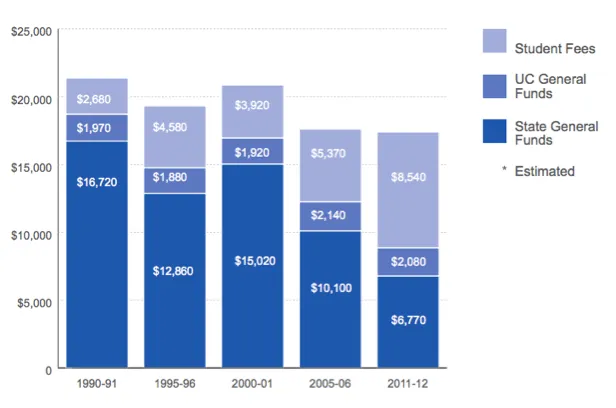Table of Contents
Hoover Fellow Dr. Hanushek argues that taxpayers shouldn’t subsidize society’s future “winners.” Does the argument hold water?
At a recent talk on campus, education policy expert Dr. Eric Hanushek made a curious remark: it’s unfair for taxpayers to subsidize the education of public university students.
Arguing that we morally need to provide cheap access to higher education is one thing, and arguing that we can’t afford to keep pouring funds into higher education is another—but here was an argument for higher tuition from a social justice standpoint.
In an interview with the Stanford Review, Hanushek elaborated.
“The people who are the winners in the future economy are the ones who graduate from college, and they get to keep most of the rewards for their success,” he argued. “If you heavily subsidize that to individuals, and take that money out of general tax revenues, many of the people who didn’t get to go to college are in fact sending these other people to college who then succeed.”
In other words, using taxpayer money to keep tuition fees at public universities lower than the colleges’ actual costs—which is, generally speaking, what private schools charge—ends up being regressive; higher-income students disproportionately benefit from the subsidies.
Given the current state of California’s higher education, Hanushek’s view isn’t exactly conventional wisdom. Tuitions have been going up—a lot.
The last decade has seen steep tuition increases in both UC and CSU (see Figure 1), thanks to California’s continuous disinvestment in higher education—in 2010, the state spent $1.6 billion less than it did in 2001. And in 2011-12, UC students paid a larger share of their costs than the state for the first time (see Figure 2).
To be sure, educational policy will not be improved if we only raise tuition. Hanushek said he would want tuition hikes to be accompanied with robust programs that guarantee loans and outright grants to students who need them.
Thus, state support would be more targeted than our current policy, and students who could afford college would not be subsidized needlessly. It’s hard to imagine enrollment significantly declining if the accompanying programs Hanushek envisions are implemented effectively. (Admittedly, whether it’s even conceivable that California would adequately fund them is an unfortunately on-point question.)
According to the Los Angeles Times, the wealthiest 1 percent contributed 40.9 percent of the state’s income tax revenue in 2010. It’s trickier to calculate the tax burden of any subgroup when we take into account all taxes, but according to Hanushek, “California has quite a skewed distribution of who pays taxes. Roughly the top half of the income distribution pays all the taxes.”
If this is so, isn’t the case for higher tuition weakened? Hanushek responded, “Well, some of the people that succeed pay more taxes, but there are many others who are in the top half of the income distribution who did not get the subsidies to go to college. [They] either didn’t go to college or paid for it on their own.”
But subsidizing future winners’ education with current winners’ money seems far less objectionable than a subsidy shouldered by all. Is it a problem if the currently prosperous finance the education of the prosperous-to-be? Hanushek might be right to point out that it’s *odd *that the education of public university students are subsidized across the board despite their relatively high future prospects, without even means-testing their current ability to pay. If the subsidy is coming from the most prosperous 50 percent, though, then it’s less clear whether there’s an ethical issue with the policy.
Furthermore, most subsidies are funded by people who don’t directly see the benefits. The fact that many of the currently wealthy might have not gone to public universities doesn’t present a problem on its face.
Still, in places with highly progressive tax schemes, Hanushek’s general argument points towards means-testing public university students’ tuition fees, especially if the extra revenue go to providing more grants. And in places where lower-income individuals significantly contribute to the taxes that facilitate low tuition for college-goers, Hanushek seems to have somehow made the perfect liberal case for tuition hikes.





